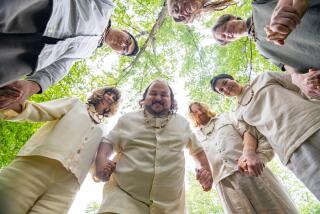As a Speaker, He Can’t Expect More Than Faint Praise
- Share via
They say it’s the average person’s greatest fear. No, not being stuck alone in an elevator with Howard Stern.
Public speaking.
Next lifetime, I’m studying human behavior in college. I’ve got to learn why you can confidently read something aloud in the privacy of your home (even throwing in a couple of hand flourishes and dramatic pauses for maximum effect) and yet take that same speech in front of 30 people and suddenly feel like you’ve just gotten off the Teacups at Disneyland.
Don’t you hate those people who can just get up in front of a group and not even break a sweat? Me, too. Most of us relate more closely to Albert Brooks, who played a TV reporter in “Broadcast News.” Brooks finally got his big chance to be a weekend anchorman, but got so nervous once the camera rolled that he sweated right through his makeup, not to mention his suit coat.
Public speaking is on my mind because I had a gig yesterday. Every so often, a group asks me to speak, and I almost always say no. It has nothing to do with the group--I’m just a chicken.
But in a weak moment, I said yes to the Corona del Mar Kiwanians. My stomach was churning all morning in anticipation of the luncheon, so much so that I could only nibble at the lasagna and garlic bread they served--normally two of my favorite foods.
Why are people so afraid to stand up and talk, even when they know it’s a friendly audience?
“I suppose a person is scared of making a fool of himself, or something like that,” says Dave Gardner, district governor of the Toastmasters groups in Orange County. Toastmasters is the international organization that teaches people how to overcome their fear of public speaking, and Gardner shocked me by saying there are about 160 clubs in Orange County, averaging a little more than 20 members a club.
“The bottom line of public speaking is that, just like anything else, with repetition you become better,” Gardner said. Only about 5% of the Toastmaster members regularly give speeches, Gardner said, with most joining simply to improve their social skills.
Painfully shy as a young man, Gardner said he was so self-conscious he’d freeze in simple one-on-one conversations. He credits Toastmasters with helping him build a successful commercial printing business for 35 years. As for me, fear of public speaking is grounded in something much more tangible than making a fool of myself. I’m a fainter.
At least, I used to be. I don’t know if you lose that designation if you haven’t done it in a while, but for my money, once a fainter always a fainter.
As any fainter knows, you feel it coming well in advance of the actual moment of swooning. Knowing you’re about to faint serves two purposes--it not only increases your panic, it gives you ample time to imagine what big laughs the audience will get out of your impending swan dive.
I’ve fainted twice in my life, both times to appreciative audiences. The first time was in seventh grade, in shop class. We were tightly bunched around our teacher, who was giving a brilliant display of his mastery of the lathe. Suddenly, little birdies started going tweet-tweet, and the next thing I remember I was looking at the ceiling and the teacher was screaming for the school nurse.
The second time was in college while leading a youth group in prayer. It was my first Sunday as president of the group, and I was sporting a smartly woven double-breasted suit that offered all the breathing room of a straitjacket. Somewhere between “ . . . and thank you for the birds and thank you for all Your divine gifts,” I got that old familiar feeling of semi-delirium. The next thing I remembered was waking up.
Trust me, tremendous laughs. While regaling me afterward with the details, a friend said the last words I got out before hitting the deck were, “Oh, boy.”
The point is, after you’ve keeled over a couple times, you’re scared for life.
The good news is things went OK with the Kiwanians. They said I looked comfortable. They probably wouldn’t believe me if I told them that midway through the talk, and only for about 15 or 20 seconds, I felt some fluttering and low-grade panic. Luckily, it passed and I finished without incident.
“We say we all have butterflies,” Gardner said. “In Toastmasters, we say we at least like to get the butterflies to fly in formation.”
Ah, butterflies in formation. What an aesthetically pleasing sight that would be as you’re lying on your back with a damp rag on your forehead and looking up at a spinning chandelier.
More to Read
Sign up for Essential California
The most important California stories and recommendations in your inbox every morning.
You may occasionally receive promotional content from the Los Angeles Times.










